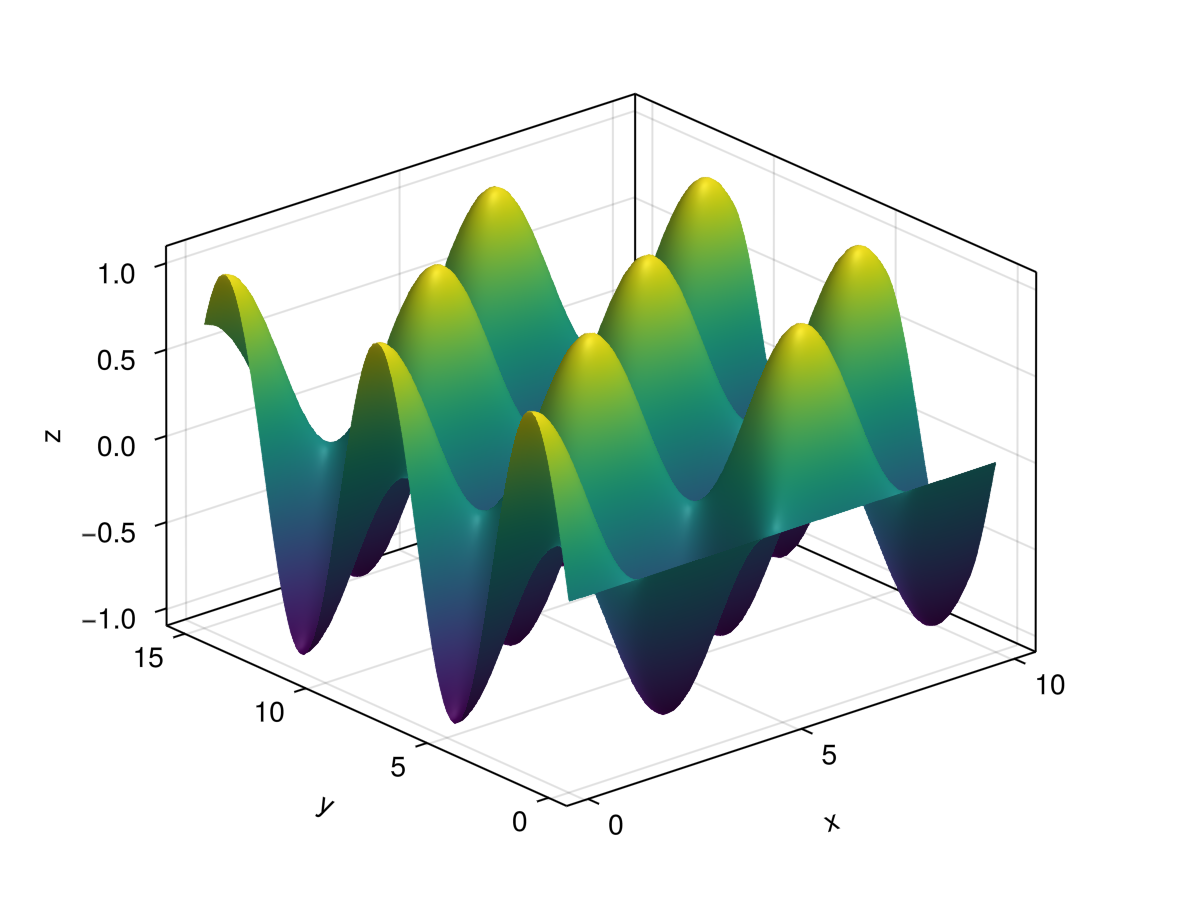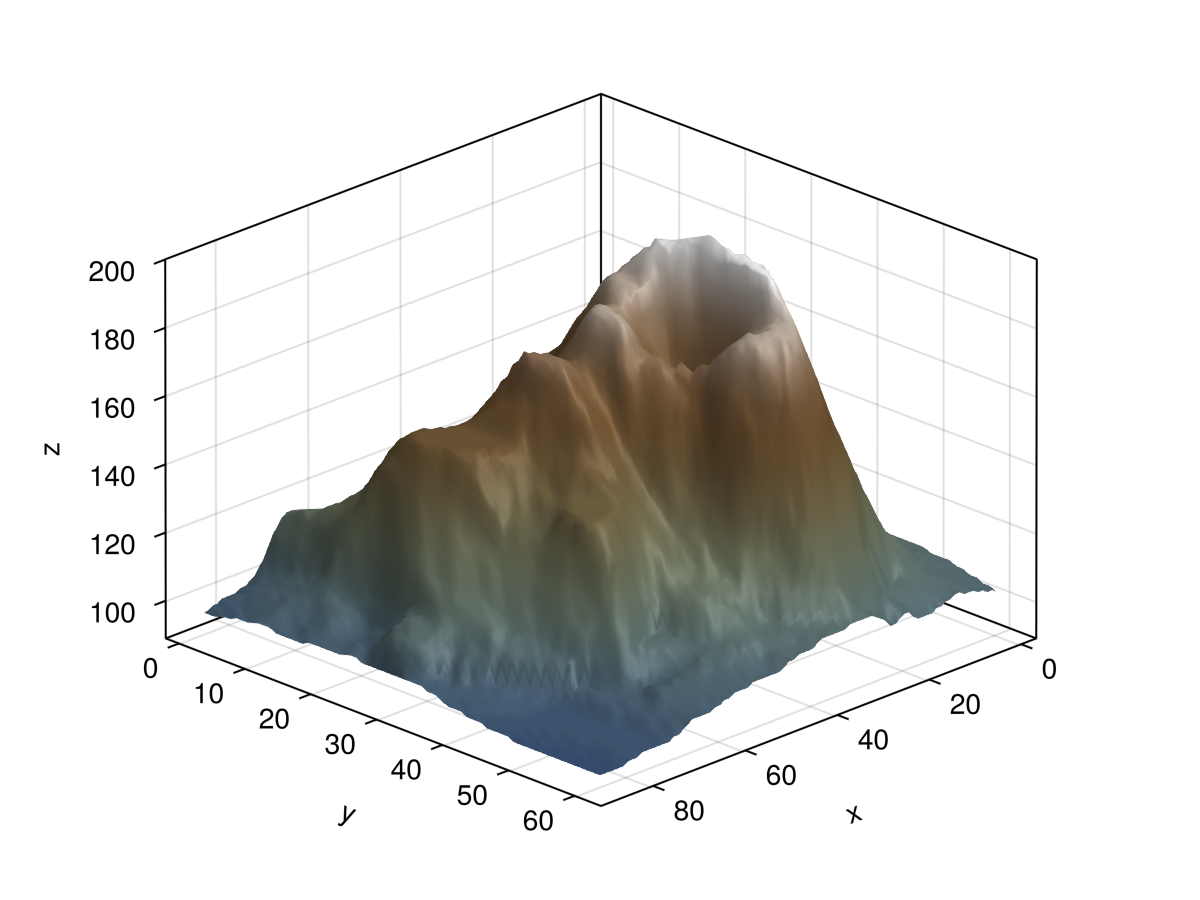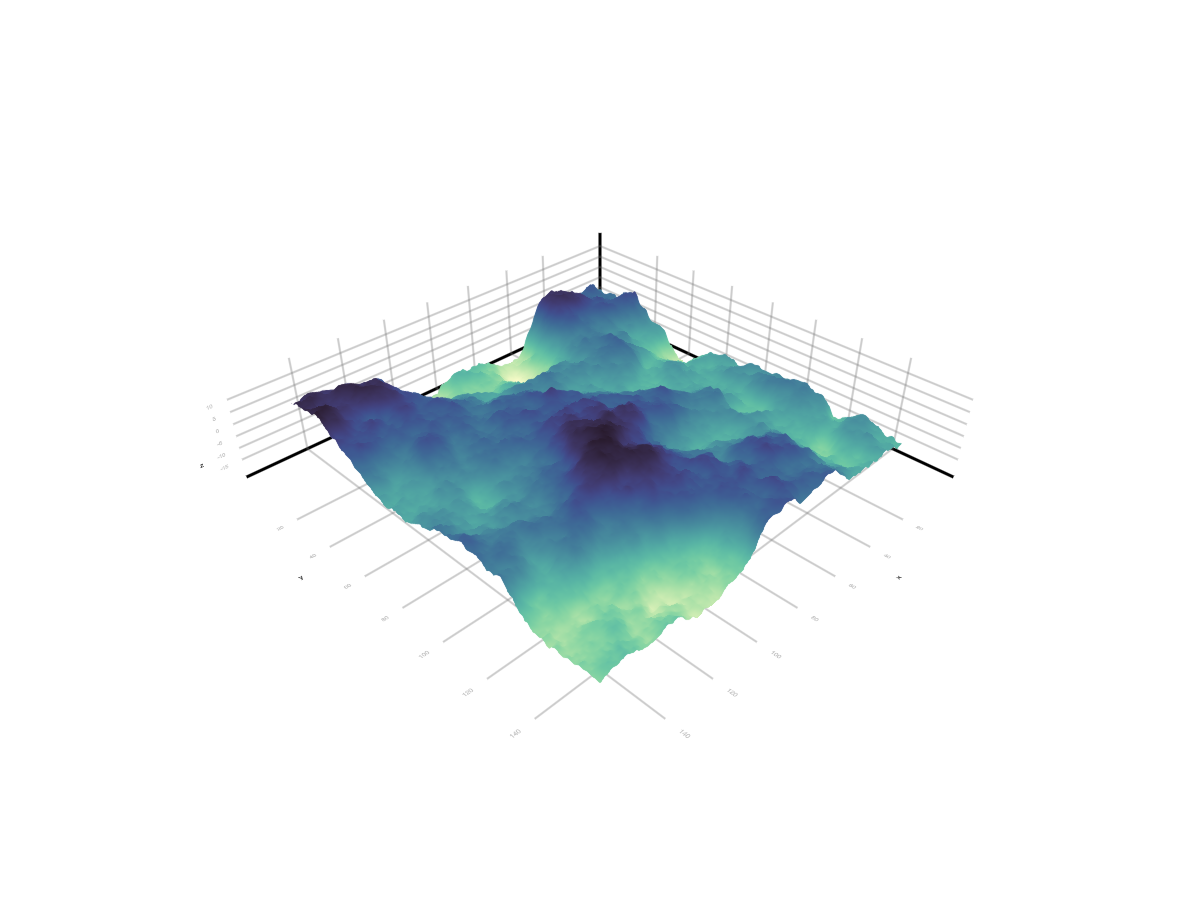surface
MakieCore.surface Function
surface(x, y, z)
surface(z)Plots a surface, where (x, y) define a grid whose heights are the entries in z. x and y may be Vectors which define a regular grid, or Matrices which define an irregular grid.
Plot type
The plot type alias for the surface function is Surface.
Examples
using GLMakie
xs = LinRange(0, 10, 100)
ys = LinRange(0, 15, 100)
zs = [cos(x) * sin(y) for x in xs, y in ys]
surface(xs, ys, zs, axis=(type=Axis3,))
using GLMakie
using DelimitedFiles
volcano = readdlm(Makie.assetpath("volcano.csv"), ',', Float64)
surface(volcano,
colormap = :darkterrain,
colorrange = (80, 190),
axis=(type=Axis3, azimuth = pi/4))
using GLMakie
using SparseArrays
using LinearAlgebra
# This example was provided by Moritz Schauer (@mschauer).
#=
Define the precision matrix (inverse covariance matrix)
for the Gaussian noise matrix. It approximately coincides
with the Laplacian of the 2d grid or the graph representing
the neighborhood relation of pixels in the picture,
https://en.wikipedia.org/wiki/Laplacian_matrix
=#
function gridlaplacian(m, n)
S = sparse(0.0I, n*m, n*m)
linear = LinearIndices((1:m, 1:n))
for i in 1:m
for j in 1:n
for (i2, j2) in ((i + 1, j), (i, j + 1))
if i2 <= m && j2 <= n
S[linear[i, j], linear[i2, j2]] -= 1
S[linear[i2, j2], linear[i, j]] -= 1
S[linear[i, j], linear[i, j]] += 1
S[linear[i2, j2], linear[i2, j2]] += 1
end
end
end
end
return S
end
# d is used to denote the size of the data
d = 150
# Sample centered Gaussian noise with the right correlation by the method
# based on the Cholesky decomposition of the precision matrix
data = 0.1randn(d,d) + reshape(
cholesky(gridlaplacian(d,d) + 0.003I) \ randn(d*d),
d, d
)
surface(data; shading = NoShading, colormap = :deep)
surface(data; shading = NoShading, colormap = :deep)
Attributes
alpha
Defaults to 1.0
The alpha value of the colormap or color attribute. Multiple alphas like in plot(alpha=0.2, color=(:red, 0.5), will get multiplied.
backlight
Defaults to 0.0
Sets a weight for secondary light calculation with inverted normals.
clip_planes
Defaults to automatic
Clip planes offer a way to do clipping in 3D space. You can set a Vector of up to 8 Plane3f planes here, behind which plots will be clipped (i.e. become invisible). By default clip planes are inherited from the parent plot or scene. You can remove parent clip_planes by passing Plane3f[].
color
Defaults to nothing
Can be set to an Matrix{<: Union{Number, Colorant}} to color surface independent of the z component. If color=nothing, it defaults to color=z.
colormap
Defaults to @inherit colormap :viridis
Sets the colormap that is sampled for numeric colors. PlotUtils.cgrad(...), Makie.Reverse(any_colormap) can be used as well, or any symbol from ColorBrewer or PlotUtils. To see all available color gradients, you can call Makie.available_gradients().
colorrange
Defaults to automatic
The values representing the start and end points of colormap.
colorscale
Defaults to identity
The color transform function. Can be any function, but only works well together with Colorbar for identity, log, log2, log10, sqrt, logit, Makie.pseudolog10 and Makie.Symlog10.
depth_shift
Defaults to 0.0
adjusts the depth value of a plot after all other transformations, i.e. in clip space, where 0 <= depth <= 1. This only applies to GLMakie and WGLMakie and can be used to adjust render order (like a tunable overdraw).
diffuse
Defaults to 1.0
Sets how strongly the red, green and blue channel react to diffuse (scattered) light.
fxaa
Defaults to true
adjusts whether the plot is rendered with fxaa (anti-aliasing, GLMakie only).
highclip
Defaults to automatic
The color for any value above the colorrange.
inspectable
Defaults to true
sets whether this plot should be seen by DataInspector.
inspector_clear
Defaults to automatic
Sets a callback function (inspector, plot) -> ... for cleaning up custom indicators in DataInspector.
inspector_hover
Defaults to automatic
Sets a callback function (inspector, plot, index) -> ... which replaces the default show_data methods.
inspector_label
Defaults to automatic
Sets a callback function (plot, index, position) -> string which replaces the default label generated by DataInspector.
interpolate
Defaults to true
[(W)GLMakie only] Specifies whether the surface matrix gets sampled with interpolation.
invert_normals
Defaults to false
Inverts the normals generated for the surface. This can be useful to illuminate the other side of the surface.
lowclip
Defaults to automatic
The color for any value below the colorrange.
material
Defaults to nothing
RPRMakie only attribute to set complex RadeonProRender materials. Warning, how to set an RPR material may change and other backends will ignore this attribute
model
Defaults to automatic
Sets a model matrix for the plot. This overrides adjustments made with translate!, rotate! and scale!.
nan_color
Defaults to :transparent
The color for NaN values.
overdraw
Defaults to false
Controls if the plot will draw over other plots. This specifically means ignoring depth checks in GL backends
shading
Defaults to automatic
Sets the lighting algorithm used. Options are NoShading (no lighting), FastShading (AmbientLight + PointLight) or MultiLightShading (Multiple lights, GLMakie only). Note that this does not affect RPRMakie.
shininess
Defaults to 32.0
Sets how sharp the reflection is.
space
Defaults to :data
sets the transformation space for box encompassing the plot. See Makie.spaces() for possible inputs.
specular
Defaults to 0.2
Sets how strongly the object reflects light in the red, green and blue channels.
ssao
Defaults to false
Adjusts whether the plot is rendered with ssao (screen space ambient occlusion). Note that this only makes sense in 3D plots and is only applicable with fxaa = true.
transformation
Defaults to automatic
No docs available.
transparency
Defaults to false
Adjusts how the plot deals with transparency. In GLMakie transparency = true results in using Order Independent Transparency.
uv_transform
Defaults to automatic
Sets a transform for uv coordinates, which controls how a texture is mapped to a surface. The attribute can be I, scale::VecTypes{2}, (translation::VecTypes{2}, scale::VecTypes{2}), any of :rotr90, :rotl90, :rot180, :swap_xy/:transpose, :flip_x, :flip_y, :flip_xy, or most generally a Makie.Mat{2, 3, Float32} or Makie.Mat3f as returned by Makie.uv_transform(). They can also be changed by passing a tuple (op3, op2, op1).
visible
Defaults to true
Controls whether the plot will be rendered or not.